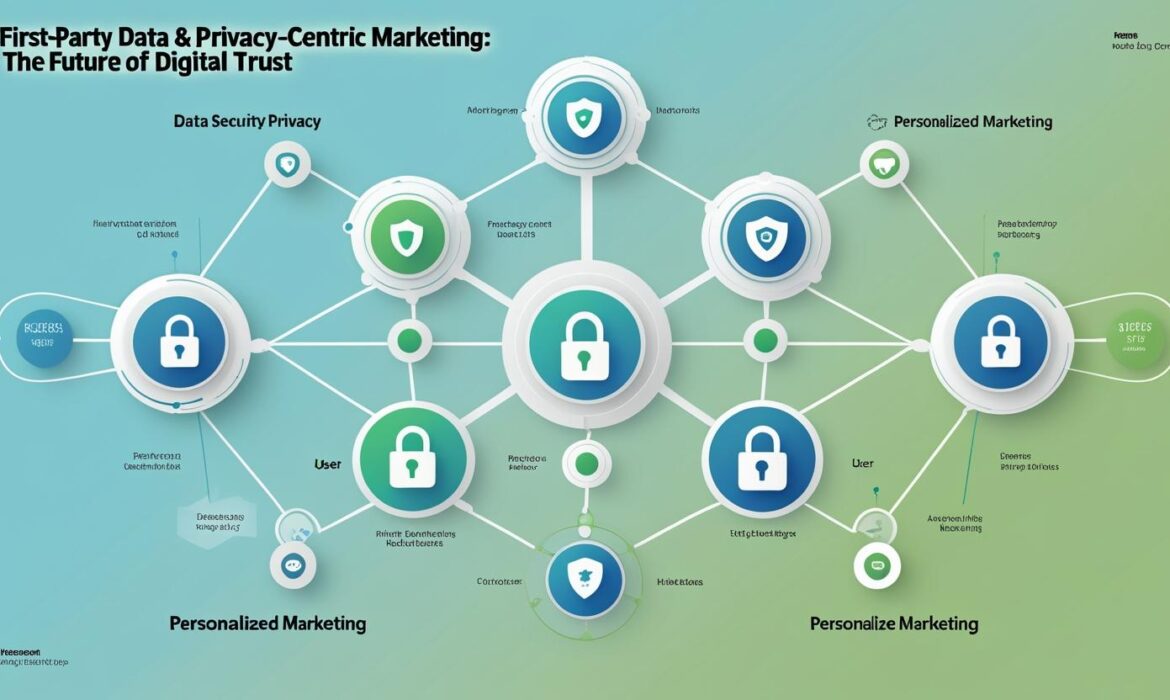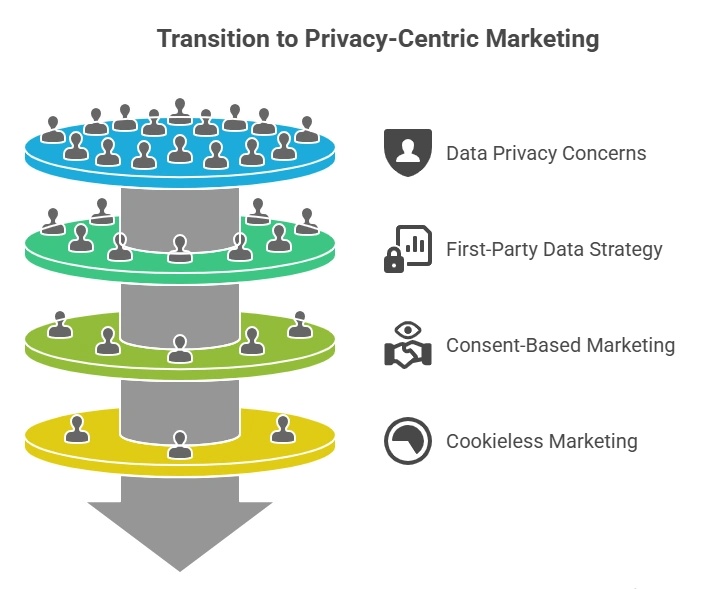
In a world where consumer data is gold and privacy concerns are at an all-time high, brands must now rethink how they collect, store, and use user information. The shift toward privacy-centric marketing is not just regulatory—it’s strategic. At the core of this transformation lies the first party data strategy, which is helping marketers build trust, stay compliant, and prepare for a cookieless marketing future.
With third-party cookies being deprecated by browsers like Chrome, and data regulations such as GDPR and India’s DPDP Act becoming stricter, businesses must embrace consent-based marketing and ethical data practices to stay relevant. According to a 2024 Forrester report, companies using a strong first party data strategy witnessed a 32% increase in customer retention and a 26% uplift in ROI compared to those relying on third-party data.
In this blog, we’ll explore how first party data is transforming digital marketing, why data privacy in digital marketing matters more than ever, and how to future-proof your campaigns with a privacy-centric marketing approach.

What Is First Party Data?
First party data is the information collected directly from your audience through owned digital assets like websites, mobile apps, email forms, CRM systems, and surveys. This includes:
- Name, email, phone number
- Purchase history
- Browsing behavior on your site
- Preferences and interests
- Engagement metrics (time on site, clicks, scroll depth)
Unlike third-party cookies, this data is collected with the user’s knowledge and permission—making it the foundation of a strong consent-based marketing approach.
The difference? First party data is accurate, permissioned, and privacy-compliant. It empowers brands to create personalized experiences while respecting user choice—a key pillar of privacy-centric marketing.
The End of Cookies: Welcome to the Cookieless Era
The traditional approach of tracking users across the web via third-party cookies is quickly becoming obsolete. As part of its Privacy Sandbox initiative, Google Chrome will block third-party cookies for all users by 2025.
This shift demands a strategic pivot to the cookieless marketing future. Brands can no longer rely on purchased audience data or retargeting across third-party platforms. Instead, they must invest in building their own data ecosystems grounded in first party data strategy.
A Deloitte survey revealed that 71% of CMOs believe first party data is now the most valuable marketing asset—and key to sustaining long-term growth in a privacy-first internet.
Why Data Privacy in Digital Marketing Matters
Data privacy in digital marketing isn’t just about compliance—it’s about earning and keeping customer trust. Misuse of data can not only result in legal penalties but also cause irreversible damage to brand reputation.
Here’s why brands must prioritize privacy:
1. Regulatory Compliance
New laws like GDPR, CCPA, and India’s DPDP Act require brands to adopt consent-based marketing. Violations can lead to fines in the millions.
2. Consumer Expectations
A Salesforce report shows that 86% of consumers want more transparency in how their data is used, and 72% will stop buying from brands they don’t trust.
3. Competitive Advantage
Brands with a solid privacy-centric marketing approach enjoy higher loyalty and reduced churn because customers feel respected and secure.
Building a First Party Data Strategy That Works
Creating a robust first party data strategy means collecting data ethically, using it effectively, and storing it securely. Here’s how to get started:
1. Offer Value for Data
Incentivize users to share their information by offering discounts, exclusive content, or loyalty rewards. This supports both consent-based marketing and user engagement.
2. Use Clean and Structured Data
Organize your data using a CRM or CDP (Customer Data Platform). Accurate data leads to better personalization and smarter automation.
3. Integrate Across Channels
Leverage data across email, social, ads, and mobile to ensure consistent messaging. Omnichannel personalization becomes possible only when your first party data strategy is aligned across touchpoints.
4. Respect Preferences
Always allow users to opt out, set preferences, or request data deletion. This builds long-term trust and strengthens your privacy-centric marketing brand identity.
Consent-Based Marketing in Action
Let’s look at a real-world example.
A fintech startup built its entire email list using consent-based marketing—no purchased data, no cold outreach. Users opted in via a value-based lead magnet and were segmented by interests collected through quizzes.
Result:
- Open rate increased by 52%
- CTR improved by 37%
- Unsubscribe rate dropped by 45%
- Customer acquisition cost (CAC) decreased by 28%
These results highlight that privacy-centric marketing doesn’t hinder performance—it enhances it by building genuine relationships.
Transitioning to a Cookieless Marketing Future
As third-party cookies vanish, here are actionable steps to navigate the cookieless marketing future:
1. Invest in Owned Media
Build engagement on channels you control—like your blog, email, app, and community platforms.
2. Use Contextual Targeting
Target users based on page content, not behavior. Contextual ads don’t require personal data but can be just as effective.
3. Leverage Zero-Party Data
This is data users intentionally share, like preferences or goals. Pair it with your first party data strategy to improve personalization.
4. Adopt Privacy-Enhancing Technologies
Use solutions like server-side tagging, data clean rooms, and differential privacy models to remain compliant while maintaining marketing effectiveness.
The Future of Privacy-Centric Marketing
As we move into 2025 and beyond, privacy-centric marketing will become the default—not the exception. Brands that proactively adapt will outperform their competitors on both trust and performance metrics.
Key future trends include:
- AI-driven personalization using first party data
- Consent orchestration platforms for real-time compliance
- Cookieless retargeting using clean room environments
- Privacy-first analytics replacing traditional tracking pixels
According to Gartner, by 2026, 75% of digital marketers will pivot to first-party and zero-party data as their primary data sources.
Conclusion
In the new age of digital marketing, first party data strategy is your greatest asset. Brands that embrace consent-based marketing, respect data privacy in digital marketing, and prepare for the cookieless marketing future are not only future-proof—they’re trust-proof.
As regulations tighten and consumers grow more privacy-aware, marketers must move beyond intrusive tracking and toward meaningful engagement. That means giving users control, offering value, and building campaigns rooted in transparency.
It’s time to stop renting audiences—and start owning relationships. The future belongs to those who make privacy-centric marketing a core part of their business strategy.
Ready to deliver truly personalized experiences? Contact Us to build hyper-personalized campaigns that convert.


